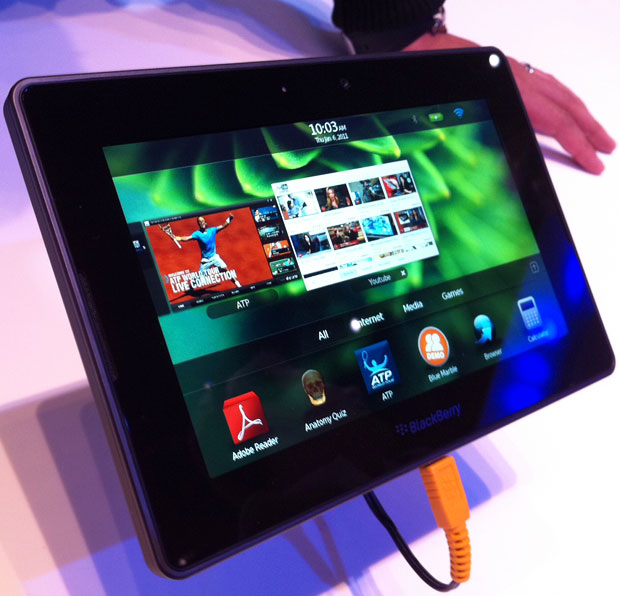
BlackBerry CEO Thorstein Heins made some bold claims in an interview at the Milken Institute conference in Los Angeles on Monday. For one, he predicted a big turnaround for the company, suggesting that BlackBerry could once again become the absolute leader in mobile computing.
What raised more eyebrows, though, was Heins’ prediction that in five years, tablets might be out.
Tablets are not a good business model, he maintained.
That comment drew a lot of skepticism — and some scorn — but given that the market is contstantly evolving, could Heins be onto something?
“Technology moves very quickly and it goes through an arc,” said Rhoda Alexander, senior manager for monitors and tablets at IHS iSuppli, “but with that in mind, our forecasts show a large tablet market in five years.”
BlackBerry’s official line is that what its chief said on Monday was nothing new.
“The comments that Thorsten made yesterday are in line with previous comments he has made about the future of mobile computing overall, and the possibilities that come with a platform like BlackBerry 10,” Public Relations Manager Kim Geiger told TechNewsWorld.
“We continue to evaluate our tablet strategy, but we are not making any shifts in that strategy in the short term,” she added. “When we do have information about our PlayBook strategy, we will share it.
Off the Cuff or Visionary?
Of course, Heins has previously suggested that the company wouldn’t reenter the market unless there was the potential for success. Whether the tablet form factor is a fixture or a passing fad has little bearing on BlackBerry’s own tablet fortunes — the PlayBook was a flop.

“On the surface, Heins’ statement seems to qualify as a classic case of spilled-milk whining by a guy whose company can’t seem to fight its way out of a paper bag,” said Charles King, principal analyst at Pund-IT.
“But consider the subject, tablets, from a slightly unconventional angle — not as devices, so much as a new form of computational interaction,” he suggested.
“In that sense, the success of tablets isn’t about a particular vendor or product, like Apple”s iPad, so much as it is about end users evolving and becoming ready for increasingly mobile and unencumbered access to information,” King added.
Market in Motion
Heins’ statement could end up being prophetic in that the market will certainly change. Just five years ago, few could likely foresee that the tablet would become as popular as it is today. Evolution won’t stand still for the next five years either.
“Remember the tiny laptops from a few years ago?” asked telecommunications analyst Jeff Kagan.
“They were a flash in the pan,” he said.
“Tablets are real — but they are still brand new,” Kagan told TechNewsWorld.
“The marketplace of tomorrow will have tablets and laptops and smartphones. They will all grow, and they will be tied together on the same service plan, and they will all access your data stored in the cloud,” he noted.
“So will tablets be gone? No. But they will stop eating up laptop market share at some point,” Kagan maintained.
Refined Devices
It is very possible that the tablet could overlap with the smartphone or with the traditional laptop. Some makers have introduced convertible devices that are both tablet and PC, and users are able to add keyboards and other perhiperals to many tablet models.
“The usage is still evolving, especially for those who grew up in the traditional computer model with keyboard and mouse,” added iSuppli’s Alexander.
“There is danger in dating oneself in not seeing that there will be a transition in how work gets done,” she told TechNewsWorld.
Circling back to Heins’ statement about the business model, he could have meant that he didn’t see a place for tablets in business environments.
“Define ‘business,'” said Alexander. “Are you talking about an executive sitting at his desk? Or in retail at point of sale? Or in a warehouse to track inventory? There are all kinds of environments in business, and it is a big category.”
Never Say Never
It appears highly unlikely that BlackBerry will get back into the tablet arena any time soon, but it is worth noting that even Apple — the company that largely created the media tablet market — was determined to stick to a very specific form factor.
Under Steve Jobs, the tablet was designed as a device with a 4×3 aspect ratio (1.33:1), replicating the dimensions of a magazine. This was largely in contrast to the 16×10 aspect ratio of many laptop computer screens, which were in line with the 16×9 aspect ratio of HDTV screens. Jobs also was against smaller tablets that Apple’s rivals introduced.
“We’ve already seen one major departure from conventional tablet market wisdom in the past 12 months — the remarkable success of 7-inch devices like the Nexus 7,” Pund-IT’s King told TechNewsWorld.
Apple attempted to quickly follow Google’s lead, “despite the fact that the late Steve Jobs said the company would never build a smaller iPad,” King pointed out.
“That suggests to me that the tablets — both the technology and the marketplace — are evolving more quickly and unexpectedly than many people believe, to the point that in five years’ time, things may be far different than most expect,” he said.
“If that’s the point Heins was trying to make,” King added, “he could very well be correct.”






















































A classic case of sour grapes, and Heins is talking out his arse. The tablet is going to be with us for a long time. The form factor does things well that no other form factor does well, and that means it is here to stay for at least the foreseeable future.